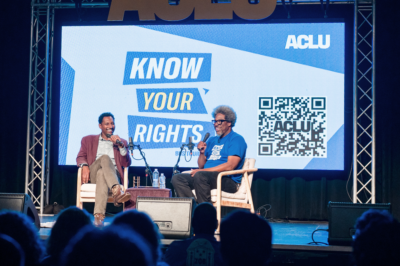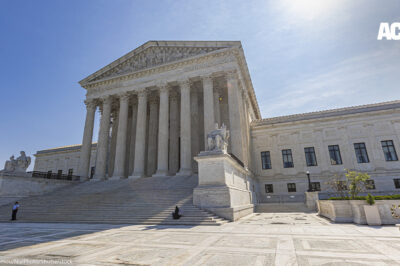ACLU Asks Court To Block Government’s Unconstitutional Attempt To Silence Pain Relief Advocate
FOR IMMEDIATE RELEASE
TOPEKA, KS – The American Civil Liberties Union today filed a motion to quash a pair of subpoenas that were issued to nationally renowned pain relief advocate Siobhan Reynolds in an effort to chill her constitutionally protected speech supporting physicians’ ability to provide appropriate pain management treatment without risk of criminal prosecution. The subpoenas are part of an ongoing grand jury investigation related to the federal prosecution of Dr. Stephen Schneider and his wife Linda, who operated a medical practice specializing in pain relief, and whose prosecution Reynolds has publicly condemned.
“The government may not use the subpoena power to chill the First Amendment rights of those with opposing views,” said ACLU attorney Scott Michelman, who, with the ACLU of Kansas & Western Missouri, represents Reynolds. “It is vital to the proper functioning of our democracy that advocates, like Ms. Reynolds, be free to speak out without fear of government retaliation.”
Reynolds is President of the Pain Relief Network (PRN), a national advocacy organization that opposes the criminal prosecution of physicians based on medical judgment. On March 10, 2009, subpoenas were issued to both Reynolds and PRN ordering that Reynolds turn over all personal and organizational communications on any subject with any former employees or patients of the Schneider Medical Clinic or with any of dozens of named individuals, including members of the Schneider family and members of the Schneiders’ legal and medical defense team, as well as a record of all Reynolds’ phone calls for the past seventeen months.
Emblematic of the subpoenas’ First Amendment intrusion is the request for correspondence with a company that Reynolds enlisted to erect a billboard in support of the Schneiders – a clear example of constitutionally protected speech, according to the ACLU. The subpoena also seeks a copy of an advocacy video Reynolds made concerning pain relief and the government’s related prosecution of physicians.
The subpoenas are part of a grand jury investigation initiated by Assistant U.S. Attorney Tanya Treadway, who is prosecuting the Schneiders and who had previously sought, and was denied, a gag order to prevent Reynolds from speaking about the Schneiders’ case. With the gag order denied, Treadway convened a grand jury and issued the subpoenas in an attempt to silence Reynolds by invading her privacy and by raising the specter of criminal prosecution, according to the ACLU.
“The chilling effect of the subpoenas on the advocacy of Ms. Reynolds, PRN, and other potential speakers is undeniable and impermissible under the First Amendment,” said Michelman.
The subpoenas are striking in their breadth, as they would force Reynolds and PRN to disclose all of their communications with a long list of individuals, whether or not the communications are in any way related to the Schneider case.
“I will not be intimidated and I will not be silenced,” said Reynolds, who founded PRN with her husband, since deceased, who suffered from an extremely painful congenital connective tissue disorder – a condition that their son inherited. “As I testified before Congress, an obsession with prescription drug abuse has resulted in the gross under-treatment of pain in this country. We have turned honest physicians and desperate patients into criminals, and policymakers and the public need to hear about it.”
The ACLU also contends that the subpoenas are an impermissible intrusion into the Schneiders’ defense team – an attempt to gain confidential information not otherwise available to the prosecution. The Schneiders have filed their own motion to quash on the basis that this material must be requested through the ordinary legal discovery process, if at all. Both motions will be heard together.
"The First Amendment bars both direct restrictions on protected speech as well as attempts to silence speakers via indirect burdens which can be potentially just as effective," said William Raney, Board President of the ACLU of Kansas & Western Missouri. "The ACLU will investigate and oppose outright bans on speech as well as efforts to 'chill' speakers by making them so uncomfortable, via threat of criminal prosecution or otherwise, that they cease communication without a straightforward gag."
A hearing in the matter is scheduled for Tuesday, May 12, at 3:30, in federal district court in Topeka.




